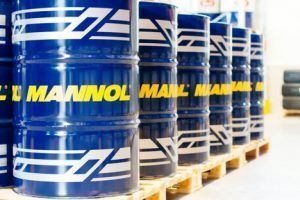Lubricants play a significant behind-the-scenes role in the construction industry. Does the phrase “running like a well-oiled machine” ring a bell? This well-known expression comes from the observation of how oil, grease, and other forms of lubricants helped propel the Industrial Revolution forward.

At present, we have reached major construction milestones a few centuries after that revolution. However, as our construction feats have increased, a vital concern has also surfaced – the environmental impact of lubricants. Now that most of us are aware of the critical state of our environment, many companies are making eco-friendly choices to support the environmentalist movement.
Here, we will explore why companies are using cleaner, greener multi-purpose lubricants for construction and what their implications are for our future.
Reducing The Environmental Impact Of Lubricants
For a long time now, the main source of multi-use lubricants used in the construction industry is petroleum-based products derived from crude oil. The construction industry currently is the second-largest sector that uses petroleum products behind the transportation industry. In the US alone, 25 to 28% percent of average daily petroleum consumption goes to the industrial sector, which is around 5 million barrels per day.
Biodegradability is another significant environmental concern posed by lubricants derived from crude oil. Petroleum-based lubricants are partially biodegradable or take a long, complicated process to break down. It is why manufacturers from Lanotec have come up with an environment-friendly and sustainable solution to the problem of biodegradability of industrial lubricants. They have formulated natural ingredients that are non-toxic, biodegradable, and have comparable lubricating performance with petroleum-based lubricants. More companies are noticing and switching to these eco-friendly alternatives, which is inspiring more manufacturers to come up with sustainable and environment-friendly lubricant solutions.
Complying With Government Environmental Regulations
As governments around the world are taking more stringent measures and regulations on using toxic and non-biodegradable products, companies, especially the construction sector, need to comply with these regulations. The stronger environmental stance of several countries further pushes companies to adopt environment-friendly processes and use sustainable and non-toxic products for their operations. Complying with government regulations also benefits companies as it ensures smooth company operations by making licenses and permits easy to obtain and avoiding penalties and legal actions. Strong cooperation between the government and private sectors regarding environment preservation helps send a strong message to other countries and companies to follow suit and take measures to help protect nature and Earth’s resources.
Addressing Performance, Savings, And Sustainability Concerns
Companies that are actively engaged in research and innovation tend to be more successful than those that don’t. This is especially true when it comes to using products used in their operations like multi-use lubricants. Petroleum-based products come from limited and exhaustible sources (fossil fuels), and companies should take measures in finding alternatives. Bio-based petroleum alternatives coming from plant and animal sources show excellent potential as multi-lubricant alternatives with the added benefits of better biological breakdown, low bioaccumulation, and reduced toxicity. When it comes to performance and reliability, natural or eco-friendly lubricant alternatives protect and enhance machine efficiency and operation on par with petroleum-based lubricants. For companies that are looking for multiple options for their lubrication applications, eco-friendly alternatives can help them gain long-term savings and future-proof their business.

Lubricants will remain significant in various industries as long as there are pieces of machinery and mechanical parts involved. Improving efficiency, protecting the moving parts, and prolonging the operational life of machines are the primary purposes of lubricants. As concerns about pollution, toxicity, and sustainability become imperative, industries are looking into greener and cleaner alternatives. In the future, being green or eco-friendly will become a vital factor that will be integrated into the creation and selection of lubricants and other industrial materials.




























